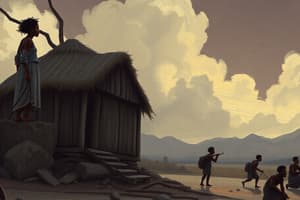Podcast
Questions and Answers
Which European country began the Atlantic slave trade on the coast of Africa in the 16th century?
Which European country began the Atlantic slave trade on the coast of Africa in the 16th century?
- Portugal (correct)
- France
- England
- Spain
What led to the deaths of millions of Native Americans during the Spanish colonization of the Americas?
What led to the deaths of millions of Native Americans during the Spanish colonization of the Americas?
- Harsh working conditions and lack of food
- Poor treatment and lack of immunity to European diseases (correct)
- Rebellion and resistance against the colonizers
- Natural disasters and climate change
What was the middle leg of the Transatlantic trade network called?
What was the middle leg of the Transatlantic trade network called?
- Middle Passage (correct)
- Transatlantic Haul
- Atlantic Crossing
- Oceanic Journey
What were enslaved Africans exposed to during the Atlantic slave trade that led to their higher survival rates in the Americas?
What were enslaved Africans exposed to during the Atlantic slave trade that led to their higher survival rates in the Americas?
What goods were moved from Europe to the Americas as part of the Transatlantic trade network?
What goods were moved from Europe to the Americas as part of the Transatlantic trade network?
Where were enslaved Africans stowed during the Middle Passage?
Where were enslaved Africans stowed during the Middle Passage?
What were the conditions of the journey across the Middle Passage that led to the deaths of many enslaved Africans?
What were the conditions of the journey across the Middle Passage that led to the deaths of many enslaved Africans?
Which prominent figures were part of the abolitionist movement in the North?
Which prominent figures were part of the abolitionist movement in the North?
What was the 'seasoning' process in North America for slaves?
What was the 'seasoning' process in North America for slaves?
What led to the increased use of slavery in the Southern colonies' tobacco and sugar plantations?
What led to the increased use of slavery in the Southern colonies' tobacco and sugar plantations?
What was a significant factor that led English settlers in North America to choose enslaved Africans over Native Americans?
What was a significant factor that led English settlers in North America to choose enslaved Africans over Native Americans?
What was the impact of the invention of the cotton gin on southern slavery?
What was the impact of the invention of the cotton gin on southern slavery?
What were the main purposes of restrictive slave codes in the South?
What were the main purposes of restrictive slave codes in the South?
What were the outcomes of the slave revolts led by Denmark Vesey and Nat Turner?
What were the outcomes of the slave revolts led by Denmark Vesey and Nat Turner?
What was the attitude of Southern planters towards the end of slavery?
What was the attitude of Southern planters towards the end of slavery?
Flashcards are hidden until you start studying
Study Notes
African Slavery in America
- "Seasoning" process in North America involved slaves learning English, receiving European names, and being auctioned off without regard for family ties
- Slavery in America differed from other parts of the world as it was inherited, all children of enslaved people became legal property of owners
- Southern colonies' tobacco and sugar plantations relied on intensive labor, leading to increased use of slavery
- English in North America chose enslaved Africans over Native Americans due to belief in their lower escape chances
- North and South of the United States had differing economic systems, with the South dependent on agriculture based on slave labor
- Abolitionist movement grew in the North, with prominent figures such as Harriet Beecher Stowe, Frederick Douglass, and William Lloyd Garrison
- Southern planters shifted from tobacco and sugar to cotton due to the invention of the cotton gin, leading to a boom in southern slavery
- Planters believed the end of slavery would mean the end of their livelihoods, leading to the institution of restrictive slave codes across the South
- Slave codes limited freedoms and behaviors of enslaved people, preventing reading, writing, legal marriage, gathering in large groups, and owning weapons
- Poor treatment and extreme restriction of lives due to slave codes led to many slave revolts, including Denmark Vesey's and Nat Turner's
- Denmark Vesey planned a slave rebellion in South Carolina but was tried and executed after the plan was leaked
- Nat Turner's 1831 rebellion resulted in the deaths of over 60 whites, making it the largest slave uprising before the Civil War
Studying That Suits You
Use AI to generate personalized quizzes and flashcards to suit your learning preferences.




